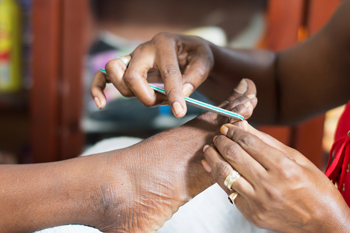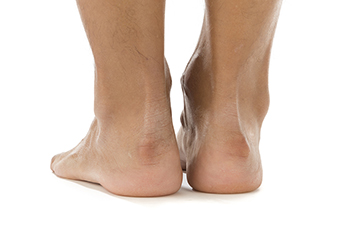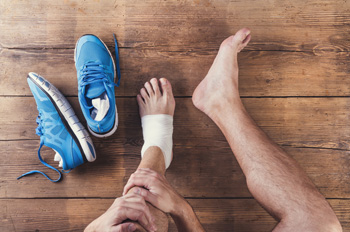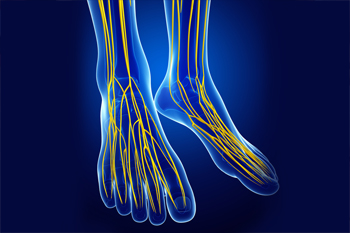Connect With Us
Blog
Items filtered by date: February 2022
What Is Ankle Dislocation?
Ankle dislocation occurs when the bones in your ankle joint move out of place, usually due to a sudden injury. Symptoms of a dislocated ankle include pain, swelling, bruising, soreness, and an inability to put weight on the affected ankle. If you suspect that you may have dislocated your ankle, there are things you can do to ease your pain while you wait to see your podiatrist. Rest and elevate the affected ankle to reduce pressure on the injury. Apply ice to reduce swelling. Take over-the-counter pain medications to relieve pain. Compressing the ankle with an elastic bandage may also be helpful. For more information about ankle dislocations, please consult with a podiatrist.
Ankle and foot injuries are common among athletes and in many sports. They can be caused by several problems and may be potentially serious. If you are feeling pain or think you were injured in a sporting event or when exercising, consult with one of our podiatrists from Sutera and Jones Surgical Podiatry. Our doctors will assess your condition and provide you with quality foot and ankle treatment.
Common Injuries
The most common injuries that occur in sporting activities include:
- Achilles Tendonitis
- Achilles Tendon Rupture
- Ankle Sprains
- Broken Foot
- Plantar Fasciitis
- Stress Fractures
- Turf Toe
Symptoms
Symptoms vary depending upon the injury and in some cases, there may be no symptoms at all. However, in most cases, some form of symptom is experienced. Pain, aching, burning, bruising, tenderness, tightness or stiffness, sensation loss, difficulty moving, and swelling are the most common symptoms.
Treatment
Just as symptoms vary depending upon the injury, so do treatment options. A common treatment method is known as the RICE method. This method involves rest, applying ice, compression and elevating the afflicted foot or ankle. If the injury appears to be more serious, surgery might be required, such as arthroscopic or reconstructive surgery. Lastly, rehabilitation or therapy might be needed to gain full functionality in the afflicted area. Any discomfort experienced by an athlete must be evaluated by a licensed, reputable medical professional.
If you have any questions, please feel free to contact one of our offices located in Media, Glen Mills, Riddle Memorial Hospital, and Concordville, PA . We offer the newest diagnostic and treatment technologies for all your foot care needs.
Foot Pain Caused by Sciatica
The sciatic nerve is the body’s largest nerve. It runs from the lower back to the knees before branching into other nerves that extend to the feet and toes. When this nerve becomes pressured or compressed, it causes a condition known as sciatica which can cause radiating or electric pain starting in the lower back down to the toes. There may even be feelings of tingling or numbness. The many possible causes of sciatica include a herniated disc, a narrowing of the spinal column due to age (spinal stenosis), bad posture, trauma, nerve disorders, muscular strain, being overweight, and vertebral misalignment. Sciatica usually affects people aged 40 and older. Those who work in awkward positions are believed to be more at risk of developing sciatica. If you believe you may have sciatica, it’s wise to contact a podiatrist for a proper diagnosis. Treatment to relieve pressure on the sciatic nerve may include massage and/or physical therapy, stretching, medication, biomechanical adjustments with orthotics, or possibly even surgery, depending on the cause.
Foot Pain
Foot pain can be extremely painful and debilitating. If you have a foot pain, consult with one of our podiatrists from Sutera and Jones Surgical Podiatry. Our doctors will assess your condition and provide you with quality foot and ankle treatment.
Causes
Foot pain is a very broad condition that could be caused by one or more ailments. The most common include:
- Bunions
- Hammertoes
- Plantar Fasciitis
- Bone Spurs
- Corns
- Tarsal Tunnel Syndrome
- Ingrown Toenails
- Arthritis (such as Gout, Rheumatoid, and Osteoarthritis)
- Flat Feet
- Injury (from stress fractures, broken toe, foot, ankle, Achilles tendon ruptures, and sprains)
- And more
Diagnosis
To figure out the cause of foot pain, podiatrists utilize several different methods. This can range from simple visual inspections and sensation tests to X-rays and MRI scans. Prior medical history, family medical history, and any recent physical traumatic events will all be taken into consideration for a proper diagnosis.
Treatment
Treatment depends upon the cause of the foot pain. Whether it is resting, staying off the foot, or having surgery; podiatrists have a number of treatment options available for foot pain.
If you have any questions, please feel free to contact one of our offices located in Media, Glen Mills, Riddle Memorial Hospital, and Concordville, PA . We offer the newest diagnostic and treatment technologies for all your foot care needs.
Reminder: When Was the Last Time...?
Treating Your Feet to Proper Care
 Even though we depend on our feet to get us around all day, it is easy to forget to give them the care they need. Selecting appropriate shoes to keep the feet healthy and safe is important. First and foremost is choosing shoes that fit well, give proper support, and will help to keep you from slipping and falling. Pay attention to the cushioning inside your shoes, especially if you spend a lot of time standing. Arch supports can help distribute the weight so the pressure is not all on the heel and ball of the foot. High heels can cause all kinds of problems, including hammertoes, bunions, calluses and corns, as well as negatively affecting your posture and alignment. It is particularly important to wear the proper shoe for each activity, paying attention to support, cushioning, width and stability. If your feet change in shape or color, begin to hurt, or feel sore on a regular basis, it is a good idea to visit a podiatrist for a complete examination to determine whether you may need custom orthotics or other treatment.
Even though we depend on our feet to get us around all day, it is easy to forget to give them the care they need. Selecting appropriate shoes to keep the feet healthy and safe is important. First and foremost is choosing shoes that fit well, give proper support, and will help to keep you from slipping and falling. Pay attention to the cushioning inside your shoes, especially if you spend a lot of time standing. Arch supports can help distribute the weight so the pressure is not all on the heel and ball of the foot. High heels can cause all kinds of problems, including hammertoes, bunions, calluses and corns, as well as negatively affecting your posture and alignment. It is particularly important to wear the proper shoe for each activity, paying attention to support, cushioning, width and stability. If your feet change in shape or color, begin to hurt, or feel sore on a regular basis, it is a good idea to visit a podiatrist for a complete examination to determine whether you may need custom orthotics or other treatment.
Everyday foot care is very important to prevent infection and other foot ailments. If you need your feet checked, contact one of our podiatrists from Sutera and Jones Surgical Podiatry. Our doctors can provide the care you need to keep you pain-free and on your feet.
Everyday Foot Care
Often, people take care of their bodies, face and hair more so than they do for their feet. But the feet are a very important aspect of our bodies, and one that we should pay more attention to. Without our feet, we would not be able to perform most daily tasks.
It is best to check your feet regularly to make sure there are no new bruises or cuts that you may not have noticed before. For dry feet, moisturizer can easily be a remedy and can be applied as often as necessary to the affected areas. Wearing shoes that fit well can also help you maintain good foot health, as well as making it easier to walk and do daily activities without the stress or pain of ill-fitting shoes, high heels, or even flip flops. Wearing clean socks with closed shoes is important to ensure that sweat and bacteria do not accumulate within the shoe. Clean socks help to prevent Athlete’s foot, fungi problems, bad odors, and can absorb sweat.
If you have any questions please feel free to contact one of our offices located in Media, Glen Mills, Riddle Memorial Hospital, and Concordville, PA . We offer the newest diagnostic and treatment technologies for all your foot and ankle needs.
What Is “Pump Bump?”
 Anyone who has ever worn high heels can probably attest to the fact that they are generally not the most comfortable shoes in the world. High heels can be damaging to the feet, increasing one’s risk of developing foot deformities like bunions and hammertoes. One type of deformity seen in people who are frequent or daily high heel wearers is a Haglund’s deformity, also known as “pump bump.” This condition occurs when an existing bony deformity that some people have on the back of their heel is irritated by habitual high heel wear. Pump bump can cause heel pain, blisters, bursitis, and Achilles tendonitis. If you are suffering from any type of heel pain, it is suggested that you seek the care of a podiatrist.
Anyone who has ever worn high heels can probably attest to the fact that they are generally not the most comfortable shoes in the world. High heels can be damaging to the feet, increasing one’s risk of developing foot deformities like bunions and hammertoes. One type of deformity seen in people who are frequent or daily high heel wearers is a Haglund’s deformity, also known as “pump bump.” This condition occurs when an existing bony deformity that some people have on the back of their heel is irritated by habitual high heel wear. Pump bump can cause heel pain, blisters, bursitis, and Achilles tendonitis. If you are suffering from any type of heel pain, it is suggested that you seek the care of a podiatrist.
High heels have a history of causing foot and ankle problems. If you have any concerns about your feet or ankles, contact one of our podiatrists from Sutera and Jones Surgical Podiatry. Our doctors can provide the care you need to keep you pain-free and on your feet.
Effects of High Heels on the Feet
High heels are popular shoes among women because of their many styles and societal appeal. Despite this, high heels can still cause many health problems if worn too frequently.
Which Parts of My Body Will Be Affected by High Heels?
- Ankle Joints
- Achilles Tendon – May shorten and stiffen with prolonged wear
- Balls of the Feet
- Knees – Heels cause the knees to bend constantly, creating stress on them
- Back – They decrease the spine’s ability to absorb shock, which may lead to back pain. The vertebrae of the lower back may compress.
What Kinds of Foot Problems Can Develop from Wearing High Heels?
- Corns
- Calluses
- Hammertoe
- Bunions
- Morton’s Neuroma
- Plantar Fasciitis
How Can I Still Wear High Heels and Maintain Foot Health?
If you want to wear high heeled shoes, make sure that you are not wearing them every day, as this will help prevent long term physical problems. Try wearing thicker heels as opposed to stilettos to distribute weight more evenly across the feet. Always make sure you are wearing the proper shoes for the right occasion, such as sneakers for exercising. If you walk to work, try carrying your heels with you and changing into them once you arrive at work. Adding inserts to your heels can help cushion your feet and absorb shock. Full foot inserts or metatarsal pads are available.
If you have any questions please feel free to contact one of our offices located in Media, Glen Mills, Riddle Memorial Hospital, and Concordville, PA . We offer the newest diagnostic and treatment technologies for all your foot and ankle needs.
Blog Archives
- March 2025
- February 2025
- January 2025
- December 2024
- November 2024
- October 2024
- September 2024
- August 2024
- July 2024
- June 2024
- May 2024
- April 2024
- March 2024
- February 2024
- January 2024
- December 2023
- November 2023
- October 2023
- September 2023
- August 2023
- July 2023
- June 2023
- May 2023
- April 2023
- March 2023
- February 2023
- January 2023
- December 2022
- November 2022
- October 2022
- September 2022
- August 2022
- July 2022
- June 2022
- May 2022
- April 2022
- March 2022
- February 2022
- January 2022
- December 2021
- November 2021
- October 2021
- September 2021
- August 2021
- July 2021
- June 2021
- May 2021
- April 2021
- March 2021
- February 2021
- January 2021
- December 2020
- November 2020
- October 2020
- September 2020
- August 2020
- July 2020
- June 2020
- May 2020
- April 2020
- March 2020
- February 2020
- January 2020
- December 2019
- November 2019
- October 2019
- September 2019
- August 2019
- July 2019
- June 2019
- May 2019
- April 2019
- March 2019
- February 2019
- January 2019
- December 2018
- November 2018
- October 2018
- September 2018
- August 2018
- July 2018
- June 2018
- May 2018
- April 2018
- March 2018
- February 2018
- January 2018
- December 2017
- November 2017
- October 2017
- September 2017
- August 2017
- July 2017
- June 2017
- May 2017
- April 2017
- March 2017
- February 2017
- January 2017
- December 2016
- November 2016
- October 2016
- September 2016
- August 2016
- July 2016
- June 2016
- May 2016
- April 2016
- March 2016
- February 2016
- January 2016
- December 2015
- November 2015
- October 2015
- September 2015
- August 2015
- July 2015
- June 2015
- May 2015
- April 2015
- March 2015
- February 2015
- January 2015
- December 2014
- November 2014
- October 2014
- September 2014



